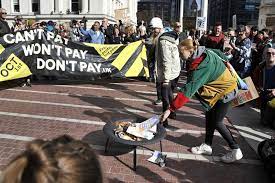Protesters in Romania used horns and drums to express their outrage at the growing expense of life. People protested in the streets across France to call for pay increases that keep up with inflation. Protests over the government’s handling of the energy crisis were held in the Czech Republic. German and British pilots participated in strikes to demand higher pay as prices rise.
The war that Russia is waging in Ukraine has caused energy costs and food prices to skyrocket for Europeans. According to the Brussels-based Bruegel think tank, even though governments have provided households and businesses with a staggering 576 billion euros (over $566 billion) in energy relief since September 2021 and natural gas prices have fallen from record highs reached during the summer, some protesters still feel that it is not enough.
Energy costs have increased inflation in the 19 nations that use the euro to a record 9.9%, making it more difficult for individuals to purchase the necessities. For some, their only option is to take to the streets.
More than 100,000 people participated in protest marches this week in numerous French cities, and Rachid Ouchem, a physician, claimed that “people today are forced to employ pressure tactics in order to achieve an increase” in wages.
According to risk consulting firm Verisk Maplecroft, the consequences of the war in Ukraine have significantly increased the risk of civil upheaval in Europe. While supplying Ukraine with weaponry and promising to wean their economies off cheap Russian oil and natural gas, European leaders have enthusiastically supported Ukraine. However, the shift hasn’t been simple and threatens to erode public support.
The energy situation cannot be solved quickly, according to Verisk Maplecroft analyst Torbjorn Soltvedt. And if anything, it appears that inflation will be worse than it has been this year next year.
As a result, he said, the relationship between economic pressure and public opinion about the conflict in Ukraine “will really be tested.”
High school teachers, rail and transport workers, and employees of public hospitals responded to a call from an oil workers’ union on Tuesday to demand pay raises and protest government interference in refinery worker strikes that have resulted in gasoline shortages in France, where inflation is running at 6.2%, the lowest rate among the 19 countries in the eurozone.
Days later, thousands of Romanians participated in a protest in Bucharest against the high cost of food, energy, and other necessities that, according to the rally’s organizers, was pushing millions of workers into poverty.
The pro-Western coalition government in the Czech Republic was called to resign by sizable crowds waving flags in Prague last month after it was revealed that the EU had supported sanctions against Russia. They also criticized the government for not doing enough to assist people and businesses who are struggling with rising energy prices.
The actions have not yet resulted in political change, as the country’s ruling coalition won a third of the seats in Parliament’s upper chamber during an election this month. However, another protest is scheduled for Prague the following week.
In recent months, a number of strikes have been organized by British rail workers, nurses, port workers, attorneys, and others in demand of pay increases that keep pace with inflation, which is at a four-decade high of 10.1%.
While recent strikes by Lufthansa pilots in Germany and other airline and airport workers around Europe seeking higher pay in line with inflation have hampered flights, trains came to a complete standstill during the transit activities.
The predicament that governments are in is demonstrated by Truss’ failed economic stimulus proposal, which included broad tax cuts and tens of billions of pounds (dollars) in relief for home and corporate energy bills without a clear plan to pay for them.
According to Soltvedt, they “have extremely little room for maneuver.”
So far, Europe’s milder-than-normal October has been the saving grace, reducing the need for gas to heat houses, according to Soltvedt.
He said, “you know we’ll definitely see an even higher spike in social unrest, risk, and political instability if we do wind up with an unforeseen disruption to the flow of gas from Europe this winter.”

















